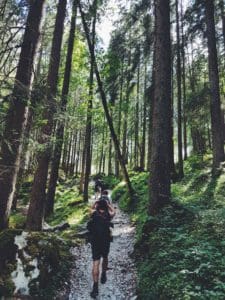When people begin a program of recovery, one of the first questions we often ask ourselves is Now what? How does anyone have fun in recovery? What do you do with all those hours of the day you once dedicated to your addiction? Why am I so bored? What do I do with myself? And will anything ever be fun again?
First, keep in mind that addictive drugs hijack the brain’s ability to feel pleasure, according to Harvard. They do this by flooding the brain with dopamine, which stimulates pleasure. Stop using, and the brain becomes dopamine depleted—and it can take a while for it to balance itself again. Someone new to recovery might not take much pleasure in anything. Not being aware of this can put someone in danger of sabotaging their recovery.
But by engaging in fun sober activities, you can work to restore your brain’s balance. Here are some ways to find fun in recovery.
6 Ways to Have Fun in Recovery
1. Be of Service
“Get out of your own head,” is common advice given to someone who’s new to recovery. As we learn, getting too wrapped up in our perceived problems and shortcomings—the way we think things should be—can be very detrimental in moving forward and finding a path towards growth.
What’s the quickest way out of “your own head”? Focus on others who need help. At first, it might seem contradictory, but being of service to others is a surefire way to increase your own self-esteem and well-being. There are many ways to be of service. Within the world of recovery, you can talk to other addicts about your experience. You can help set up or take down chairs before or after a meeting. You can invite others to fellowship after a meeting. You can pass along your phone number to a new friend so they can call you if you’re struggling. And if you’re on the phone with someone who you’ve been sharing your struggles with, you can simply ask, “Enough about me. How are you doing?”
Outside of your friends in recovery, you can be of service to your friends and family. You can help a friend move or join them on errands. Try making a meal to share, even if it’s just pasta. Help a loved one organize their pantry. Offer to go for a walk with a friend you know needs some connection.
Anything you can do to help someone else, in ways large or small, are acts of service.
2. Seek Community
Many say that addiction drives people to isolate themselves, so it stands to reason that forging connections with others helps to keep someone on the path to recovery. Seek out others who share the same interests you do.
The easiest place to find community is at a recovery-focused meeting. Who else can understand what you’ve been through? Go to a meeting and listen to others share their experience. There is little more comforting than being with a group of people who listen to your story and nod in understanding. Stay for coffee afterward.
Find a class you’re interested in, and you could find new friends there. Join a gym and take some fitness classes. Or call a friend and invite them for dinner or a walk. Connection with other people is one of the most powerful antidotes for addiction.

3. Make Stuff
One way to get your dopamine going is to foster a sense of accomplishment. Creating something can also be immensely therapeutic—this is why art and music therapy are championed by so many.
Draw a picture of your dream vacation spot. Write a fairytale—or a true story taken from your life. Make a sculpture from clay. You don’t have to create a masterpiece. It doesn’t even have to be art.
Get your hands dirty by planting vegetables in a community garden. Cook an amazing dinner, even if it’s just for you. And while you do it, don’t focus on the end results, but enjoy the journey.
4. Get Some Exercise
In active addiction, we spend so much time neglecting our bodies—it’s great for recovery to take good care of it. It’s almost like making amends to yourself by treating your body well to make up for all the time you spent abusing it.
Yoga helps to calm the mind. Running gets the heart rate going in a healthy way. Even a brisk walk can help to clear your head.
While you’re at it, consider whether you can eat better as well. Eating a balanced diet can not only improve your energy levels, but also increase your own sense of well-being.
5. Try Something New
Boredom can settle in pretty deeply when you’re waiting for your dopamine levels to come back into balance. But you should also realize that boredom is part of the human condition—we are always seeking to grow, we are always seeking new experiences. You have the chance now to fulfill that need in a healthy way by exploring activities you’ve never done before.
What’s something you’ve always wanted to do? Our brains thrive under new experiences, whether we’re learning to play an instrument for the first time or taking a trapeze class. Challenge yourself, and even if you’re not a virtuoso with a paintbrush, you’ll at least have something checked off your bucket list.

6. Explore the World Around You
This might be somewhat related to number 5, but if you explore new places, you could be in for a full sensory experience. If you live in the city, venture out into the woods; if you’re in the country, try going into town. Visiting a new place, you’ll enjoy admiring the architecture of a new locale, the sound of so many birds and bugs, the scents of a nearby river or restaurant, the tactile feel of cobblestones or fallen leaves under your feet.
You don’t have to take a trip to England or New England, or even leave town, as a matter of fact. You can explore new corners of your home city. Even if you’re simply trying a new restaurant or visiting a neighborhood you’ve never properly explored—you’re stimulating your mind.
Sources:
- https://www.thegoodtrade.com/features/sober-things-to-do-instead-of-drinking-alcohol
- https://surface.syr.edu/cgi/viewcontent.cgi?article=1550&context=sumagazine (.PDF)
The Freedom Center can support you
While infinitely rewarding, the journey of recovery can be difficult, especially when boredom kicks in. This is where The Freedom Center can help. Our team of addiction experts who can help you get through this.
Our help doesn’t stop at the Partial Hospitalization Program (PHP) and Intensive Outpatient (IOP) treatment programs, which will help prepare for sobriety. The Freedom Center will also create a solid relapse prevention plan for each client. We help you better understand what the next steps are after completing an addiction treatment program.
What do you do to have fun in recovery? What do you hope to do? Join in on the discussion by commenting below.











































